AI Rank Tracker: Boost Your Brand Visibility in ChatGPT, Gemini, Perplexity & More — Now Available 🚀
AI Rank Tracker: Boost Your Brand Visibility in ChatGPT, Gemini, Perplexity & More — Now Available 🚀
Using the best keyword tracking tools is essential for any SEO strategy as they allow efficient and accurate rank monitoring. Manual tracking, on the other hand, can be challenging due to the constant fluctuations in rankings, especially with the rise of AI-driven search results. For a modern approach to monitoring your performance in this evolving landscape, consider an AI Rank Tracking solution.
For agencies and businesses alike, choosing the right keyword monitoring tools can mean the difference between actionable insights and wasted effort. Some platforms specialize in local search, while others focus on competitor analysis or global ranking trends.
To help you find the best fit, we’ve compiled a list of ten top keyword ranking tools, each offering unique features to streamline your SEO efforts. Let’s explore which one suits your needs best.
Price: Free.
Google Analytics (GA4) is one of the most powerful tools for understanding overall website traffic and user behavior. It integrates seamlessly with Google Search Console to provide insights into how users find your site and which keywords drive the most traffic.
Since the introduction of GA4, you have access to improved tracking capabilities, including event-based tracking and AI-driven insights. GA4 is an invaluable SEO and keyword analysis tool that can be used alongside keyword monitoring tools.
Since GA4 doesn’t offer real-time keyword ranking updates, it is a great companion tool rather than a dedicated rank tracker. If you need precise, up-to-the-minute keyword performance insights, Keyword.com fills that gap with bi-hourly updates, SERP trend analysis and other features.
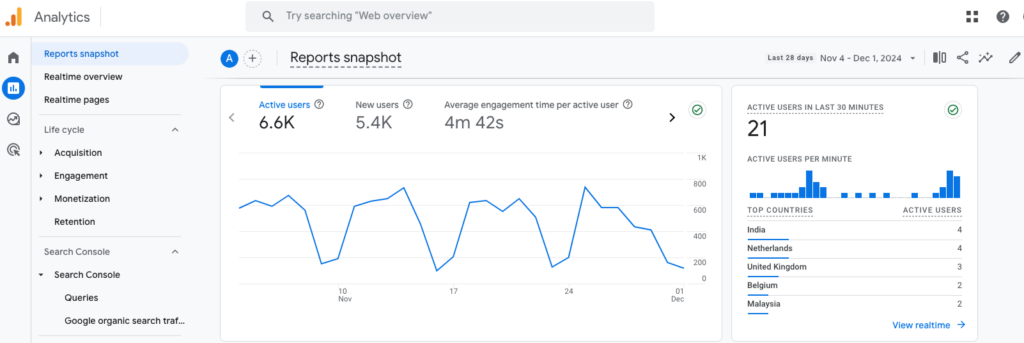
Price: Starts at $55 per month and offer a 14-day free trial.
SE Ranking offers a well-rounded keyword tracking solution, with daily updates and Google Maps monitoring. Its additional SEO features, such as website audits and backlink analysis, make it a strong all-in-one choice.
However, if timeliness and ranking precision are your top priorities, Keyword.com’s bi-hourly updates and highly accurate keyword tracking ensure you never miss a ranking change.

Price: Starts at $99 per month.
Ahrefs is an SEO toolset known for its rank-tracking features and in-depth data on backlinks, keywords, and competitors. It’s a popular choice among SEO professionals for tracking keyword rankings, analyzing SERP trends, and understanding organic traffic performance.
However, if your main focus is precise keyword tracking with high-frequency updates, Keyword.com offers a more specialized solution that ensures greater accuracy and deeper insights into search fluctuations.
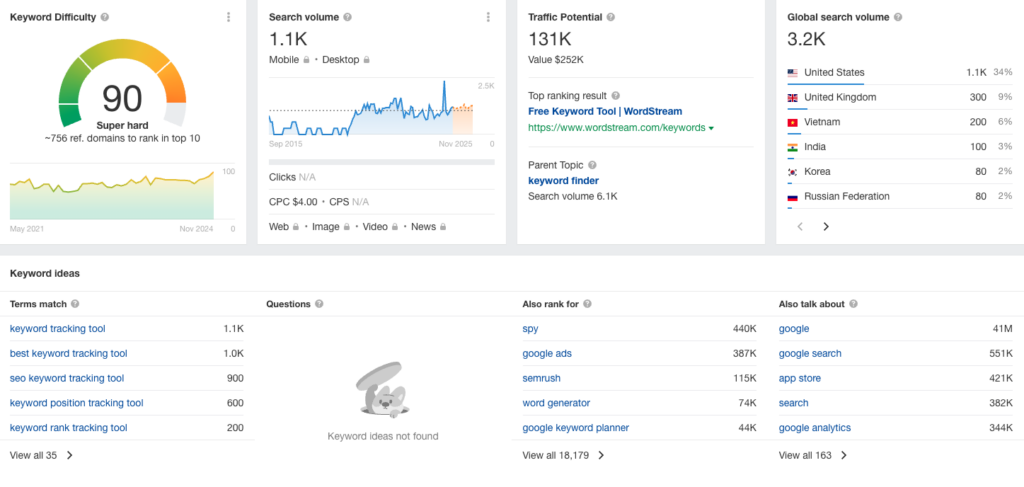
Pricing: Starts at $3 per month (with a free trial)
Keyword.com simplifies the challenges of ranking fluctuations by offering precise, real-time keyword tracking. It provides updates every two hours, ensuring the most accurate insights into search performance.
The platform highlights keyword trends, enabling you to identify SERP (Search Engine Results Page) opportunities early, including the appearance and performance within AI Overviews (see our AI Overview Tracker). Ideal for local businesses, agencies, and enterprises, Keyword.com is recognized as the most accurate amongst all keyword rank tracking tools in the Rank Tracker Accuracy report and works best when used alongside comprehensive SEO software like Ahrefs. It also offers specialized features for local rank tracking to understand your performance in specific geographic areas (explore our Local Rank Tracker). For a comprehensive view of all our tracking capabilities, visit our Rank Tracker page.
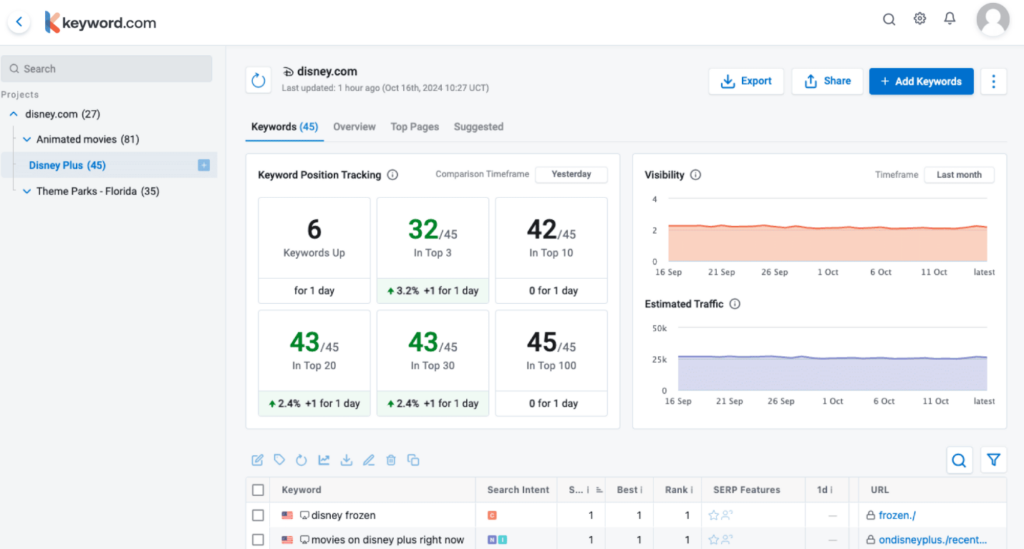
Pricing: €49 per month. It also has a 10-day free trial.
SerpWatcher by Mangools is one of the more intuitive rank-tracking tools, ideal for freelancers and smaller agencies. Its user-friendly setup allows for effortless keyword monitoring without the complexity of enterprise SEO tools. Key features include daily rank tracking, historical data, and competitor analysis, providing insights into your rankings and growth opportunities.
For those requiring more frequent updates and in-depth SERP analysis, Keyword.com offers a richer, real-time experience tailored for agencies and larger businesses.
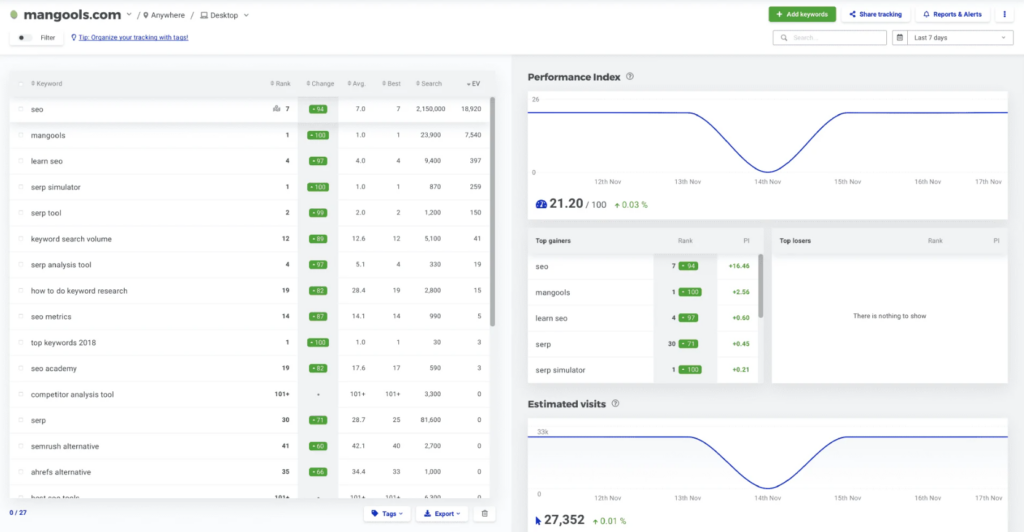
Pricing: Starts at $99 per month.
Moz Pro is a leading SEO tool known for its effective keyword-tracking capabilities. It allows you to create keyword campaigns, monitor SERP changes over time, and compare your performance with competitors to assess your strategy’s effectiveness.
With filtering options for specific locations and device types (web vs. mobile), Moz Pro offers detailed insights. It also provides data on Share of Voice, showing how much SERP space your keywords occupy compared to competitors, making it ideal for businesses targeting specific audiences.
However, for agencies and businesses that need real-time keyword movement tracking, Keyword.com provides bi-hourly updates, in-depth SERP analysis, and competitor performance monitoring. This makes it an ideal choice for those who want more frequent and accurate ranking insights.
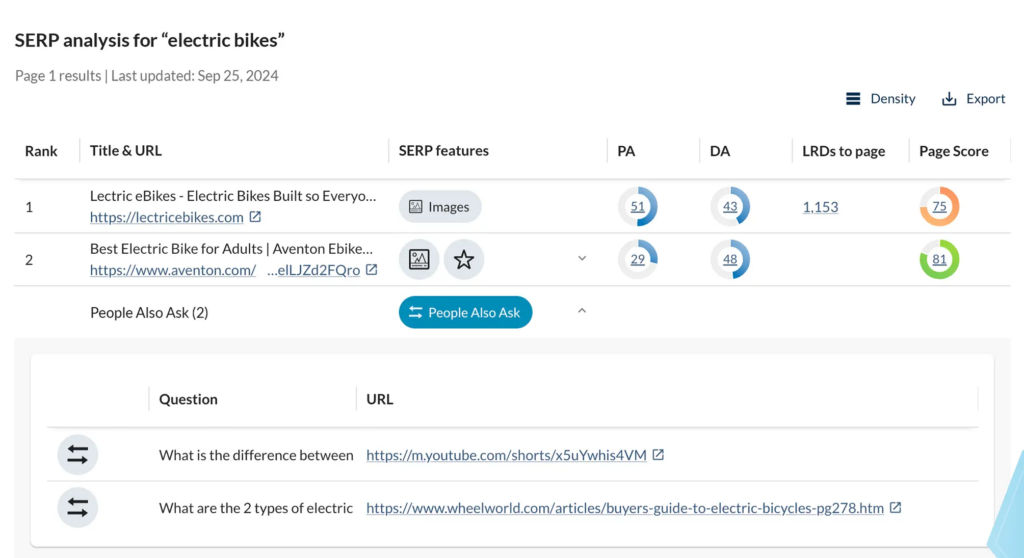
Pricing: $116 per month. It also has a 14-day free trial.
AccuRanker offers fast keyword tracking with a clean, intuitive interface, making it a strong choice for enterprises. Its ability to segment and analyze ranking data makes it useful for large-scale SEO operations.
However, for businesses looking for high accuracy and flexible pricing, other keyword monitoring tools provide enterprise-level precision at a more scalable cost.

Pricing: Free.
Google Search Console is essential for SEO professionals, providing insights into traffic-driving keywords, impressions, clicks, and average rankings. It allows you to track keyword performance for individual pages, submit sitemaps for crawling, and resolve page loading issues.
For real-time tracking and competitive analysis, consider using Keyword.com alongside GSC. It offers bi-hourly updates and precise keyword positioning, making it ideal for high-frequency ranking updates and SERP feature tracking.
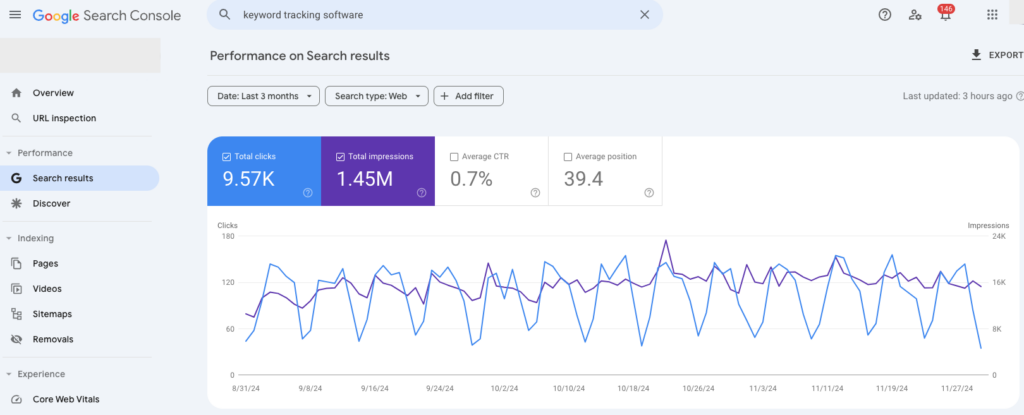
Pricing: Free and Paid Plan
A powerful alternative to Google Search Console, SEO Gets is a SEO analytics platform designed to enhance and simplify the Google Search Console (GSC) experience. Built by Guilherme Oenning and Matthew Mellinger, it offers SEO professionals, agencies, and marketers a centralized, user-friendly dashboard to manage unlimited websites and GSC accounts.

Pricing: Starts at $129.95 per month (7-day free trial available).
Semrush is one of the most comprehensive SEO and marketing tools available. It specifically targets one-person marketing teams and marketing managers to assist them with all aspects of marketing and reporting.
Its keyword tracking capabilities allow users to monitor rankings across devices and locations, analyze competitors’ keywords, and identify new opportunities.
Semrush provides a well-rounded SEO suite, but when it comes to high-frequency rank tracking, Keyword.com excels. With its bi-hourly updates and precise tracking methodology, Keyword.com ensures that your ranking data is always fresh and reliable.

We answer some frequently asked questions about keyword tracking software.
Keyword.com is a top choice for SEO agencies due to its incredibly accurate real-time ranking updates, competitor analysis, and customizable white-label reports. It can track international, national, and local keywords, making it suitable for various client needs.
For comprehensive SEO efforts, use Keyword.com as your keyword ranking tracker alongside tools like Ahrefs or Semrush, and use free Google tools to develop an exhaustive SEO strategy.
To maximize your SEO success, check out our Keyword.com keyword research tool to find and analyze the best keywords for your campaigns.
Learn more about how Keyword.com compares to the accuracy of different rank tracker SEO software tools.
When looking for the best keyword tracking tools, look for these features:
Keyword.com features all of this and more – making it an excellent tool for SEO agencies and marketers.
Keyword tracking is important for knowing which search terms bring traffic to your website and how they perform over time.
It helps you:
Try Keyword.com today to give you useful data to improve your SEO, boost your rankings, and increase conversions.